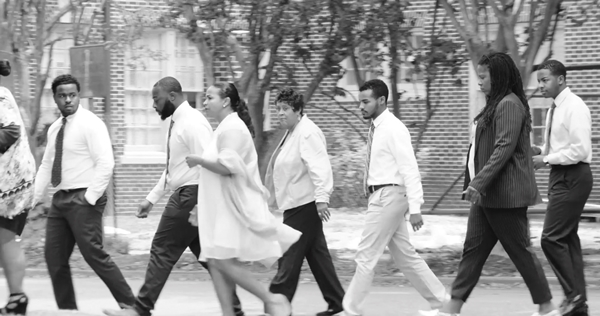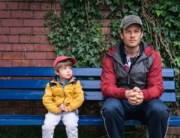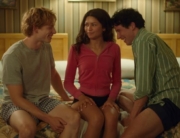

This spellbinding documentary opens with a video diary entry by Fox Rich, a young Black mother who tells the camera that her African American husband, Rob, is in jail. After revealing she’s pregnant with another child, she expresses cautious optimism that he will be back home in a week or so. Time passes. Rich continues posting videos; she gives birth to twins, who grow into school-age children before our eyes. But through it all, Rob remains behind bars.
The film also turns the clock backwards to happier times. In another home video, Fox and Rob have just bought a house in a Louisiana suburb and are getting ready to start their own business—a hip-hop themed clothing store in Shreveport. But it falters and the couple become “desperate,” according to her. An attempted bank robbery leads to their arrest. As the getaway driver, Rich receives less than four years, while Rob is stuck with a whopping 60-year sentence without any possibility of parole.
Although the film leaps backwards and forwards in time constantly, most of the film takes place 20 years into Rob’s sentence, after the family has spent all of their savings on attorneys to no avail and Rich has become an activist against racial inequality in the prison system. There is hope: his case is scheduled to be reviewed by a judge, who might decide to release him. Rich calls the judge’s office repeatedly, and the camera watches her on the phone in real time, thereby wringing maximum suspense. She’s frequently placed on hold by an assistant, during which time she alternates between frustration and staring out into space.
When someone eventually gets on the line with her, Rich must be polite, no matter how fed up she may be with the runaround. The judge will issue a ruling in two days, she is told, but then the two days are over with no news, and Rich is invited to call back. It feels very cruel to those in her position, and the question seems to be when and if Rich will at last reach a breaking point.
The film does an excellent job of humanizing an underexamined point of view. “If you do the crime, you should do the time,” Rich says, describing the attitude she has encountered toward her family’s situation. There is no denying that Rich and her husband committed a serious crime, but their punishments are so disparate, we must wonder how such arbitrary justice can be considered fair. Director Garrett Bradley also points out how Rob’s incarceration has had an effect on others beyond the couple. Fox’s mother, for example, remains resentful decades later after the arrest.
In its most poignant moments, Time delves into the psychological effects of having a loved one who’s serving such a lengthy prison sentence—how one can spend the vast majority of any given year full of hope, only to have one’s heart broken by the holidays. It takes tremendous will to find that same sense of hope in the next year, Rich confides to the camera. Her own annual renewal comes from her close-knit family, including her six remarkably resilient sons. In fact, one of the twins grows into a politically engaged teenager, every bit of a challenger like his mother.
That the sons have not only survived but have thrived is a testament to Fox, who almost single-handedly holds the family together. The film goes to great lengths to reveal her as someone who paid her debt to society and has made the most of her second chance. In one especially powerful scene, she asks the members of her church for forgiveness. Watching her reminds us of the possibilities of the criminal justice system to reform, not just punish.
Bradley tells the entire film in black-and-white, a creative decision that allows the grainy video from Rich’s phone to blend with the more conventional cinematography of the present-day footage. The latter is also especially stark: we see every crease and stress line in the subjects’ faces, which only makes them appear more vulnerable. Meanwhile, the overall aesthetic eschews the usual documentary approach of talking heads for an experience more akin to a fictional film—Bradley’s camera often appears to observe her subjects unseen. There are also moments of powerful visual poetry. When Rich first discusses the fateful robbery and how it changed her family’s lives, we segue to a car going off a road, as seen from the driver’s point of view.
Although the film clocks in at a brisk 81 minutes, it lets us into the subjects’ emotions on such intimate terms that we get more than a small taste of their pain, sadness, and ultimately their joy. Along with being one of the best films of the year so far, it’s highly relevant viewing at a time when criminal justice reform and the devastating effects of mass incarceration on Black and Brown communities remain vital topics.






Leave A Comment